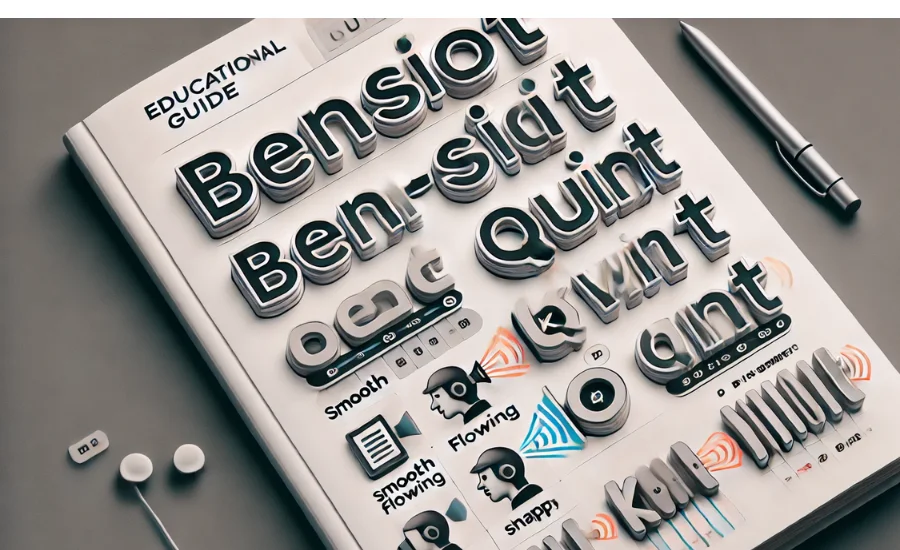How to Say Bensiot and Quint: Master the Correct Pronunciation Easily
How to Say Bensiot and Quint Pronunciation accuracy is essential for effective and clear communication. Words like “quint” and “bensiot” are examples of difficult words that many people find difficult to pronounce correctly. In this guide, we’ll provide you with clear instructions on pronouncing both “bensiot” and “quint” with ease, ensuring that you gain confidence in using these words accurately in your conversations. We will also explore why proper pronunciation is important and offer practical steps to help you master these terms effortlessly. By the end of this article, you’ll be ready to use “bensiot” and “quint” with clarity and confidence.
Understanding and Pronouncing the Word “Bensiot”

Before tackling how to pronounce “Bensiot,” it’s essential to explore its meaning and origin. While not widely recognized in English-speaking regions, “bensiot” might hold various interpretations based on its use in different contexts. Some suggest that the term could originate from specific dialects or languages, adding a layer of mystery to its significance.
How to Pronounce “Bensiot”
Breaking down the word into syllables can make its pronunciation more straightforward:
- Ben — pronounced like “pen,” with a short ‘e’ sound.
- Si — sounds like “see,” with a clear and sharp vowel.
- Ot — similar to “ought,” with a rounded ‘o’ sound.
Understanding these components will help you pronounce “bensiot” more confidently and accurately, enhancing your communication skills.
Mastering the Pronunciation of How to Say Bensiot and Quint
Even with a breakdown of how to pronounce “Bensiot” and “Quint,” it takes practice to say them smoothly and naturally. Developing a clear and confident pronunciation can make a big difference in how you communicate. Here are some practical tips to help you refine your pronunciation skills:
Tips for Perfecting Pronunciation
- Practice Gradually: Start by pronouncing the words slowly, focusing on each syllable. As you become more comfortable, gradually increase your speed until you can say them fluidly.
- Listen and Mimic: Find an audio recording or ask someone who knows the correct pronunciation to say these words for you. Listening and imitating the correct sounds is an effective way to learn.
- Syllable Breakdown: Always break down difficult words into their individual syllables. This approach helps you tackle even the most challenging pronunciations with ease.
Common Pronunciation Errors to Avoid
It’s normal to make mistakes with unfamiliar words. Let’s address some common errors people encounter with “Bensiot” and “Quint” and how to correct them:
- Overemphasizing the Last Syllable of “Bensiot”: Many people mistakenly stress the last syllable, saying “Ben-see-OT.” Instead, aim for a softer ending, pronouncing it as “Ben-see-ot” with a light touch on the final “t.”
- Pronouncing “Quint” with a Harsh “K”: When saying “Quint,” avoid using a strong “K” sound. The “Qu” should be more fluid, resembling a smooth “kw” rather than a sharp “K.”
By practicing these techniques, you’ll soon feel confident in your ability to pronounce both “Bensiot” and “Quint” like a pro, enhancing your communication skills in any conversation.
Enhance Your Vocabulary and Communication by Mastering the Pronunciation How to Say Bensiot and Quint
Expanding your vocabulary with new words like “bensiot” and refining your pronunciation can significantly improve your communication skills. Understanding and accurately pronouncing words such as “bensiot” and “quint” boosts your confidence in using them effectively in conversation. By mastering these terms, you not only expand your linguistic abilities but also convey your thoughts more clearly and precisely in various contexts.
Advanced Techniques to Perfect the Pronunciation of How to Say Bensiot and Quint

Once you have a solid foundation in pronouncing “bensiot” and “quint,” there are several strategies to elevate your skills even further. Consider these advanced methods to refine your pronunciation:
- Record Yourself Speaking: By recording and playing back your own voice, you can identify subtle areas where improvement is needed, helping you to fine-tune your pronunciation.
- Engage with Native Speakers: Practicing with someone fluent in the language will help you understand the nuances of intonation, stress, and rhythm that come naturally to native speakers.
- Utilize Language Learning Apps: Platforms like Duolingo or Babbel provide targeted pronunciation exercises and listening activities designed to sharpen your language skills.
- Incorporate Tongue Twisters into Practice: These exercises are excellent for enhancing enunciation and fluency, especially when dealing with tricky sound combinations found in words like “bensiot” and “quint.”
Implementing these advanced techniques will not only improve your pronunciation but also increase your overall confidence in speaking.
Read More: Heirloom Blue
Final Words
How to Say Bensiot and Quint Mastering the pronunciation of words like “bensiot” and “quint” not only enhances your communication skills but also boosts your confidence when engaging in conversations. You can pronounce these words accurately and with ease if you have the necessary skills, patience, and practice. Keep in mind that pronouncing words correctly requires practice, but with persistent effort, you’ll start to sound more confident and clear in your speech.
FAQ’s
Q1: What is the correct pronunciation of “bensiot”?
- The word “bensiot” is typically pronounced as “ben-see-ot,” with a soft ending on the “t.” Breaking it down into syllables can help you say it more clearly.
Q2: How do you pronounce “quint”?
- “Quint” is pronounced as “kwint,” with a smooth “kw” sound rather than a harsh “k.” Focus on blending the “qu” sound naturally.
Q3: Are there any common mistakes to avoid when saying “bensiot”?
- One common error is overemphasizing the last syllable, making it sound like “ben-see-OT.” Keep the “t” at the end soft and subtle.
Q4: Can practicing tongue twisters help with pronouncing these words?
- Yes, tongue twisters are a great way to improve your enunciation and fluency, making it easier to handle tricky words like “bensiot” and “quint.”
Q5: How can I practice my pronunciation effectively?
- Recording yourself, practicing with native speakers, and using language apps like Duolingo or Babbel are excellent ways to refine your pronunciation skills.
Q6: Is listening to native speakers useful for learning these words?
- Absolutely! Listening to native speakers can help you get a feel for the correct intonation and rhythm, which are crucial for mastering pronunciation.
Q7: Why is it important to pronounce “bensiot” and “quint” correctly?
- Pronouncing words correctly is essential for clear communication and to avoid misunderstandings, especially when these words are used in specific contexts.
Q8: What should I do if I’m still struggling with these pronunciations?
- Don’t hesitate to take it slow and break the words down into syllables. Repeating them several times until you feel comfortable will gradually improve your pronunciation.
For More Information Check It Out Blog Blower






